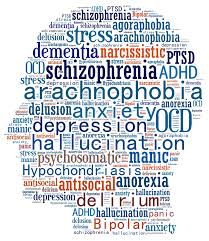Podcast link:
https://anchor.fm/boscom/episodes/2-34-Psyche--Soul--75-eqjv4e
Hello, this is Jose Parappully, Salesian priest and clinical psychologist at Sumedha Centre for Psychospiritual Wellbeing at Jeolikote, Uttarakhand, with another edition of Psyche & Soul.
In this edition I shall explore another major mental illness, namely Schizophrenia.
Edward came to therapy because he could not get along with his wife. He believed his wife does not want him to be happy. “She does everything possible to make sure I am not happy,” he said. “I am the most unfortunate person to have married her. She is ruining my life.” As an example he narrated how his wife would deliberately rattle the dishes in the kitchen so that he could not sleep. He believed that she is actually the devil in disguise. As he unfolded his story in subsequent sessions, it became quite evident that he had misgivings not only about his wife, but with almost everyone around him as well. He believed that all south Indians were against him because he was a north Indian and were trying to get him into trouble. The woman he worked with at the office was deliberately plotting to get him dismissed from the job. Auto-rickshaw drivers were honking as he passed them on the road to deliberately annoy him. His cousin was turning his aunt against him. His mother-in-law was sending him bad vibes, so that he would get sick and die….
Edward was diagnosed as suffering from and being treated for paranoid Schizophrenia.
What is Schizophrenia?
Schizophrenia (literally splitting of the brain) is the most serious of all mental disorders. Although not as common as the other major mental disorders, it debilitates people more than the others affecting their educational and occupational performance, as well as everyday life and relationships. Most beds in mental institutions are filled by patients suffering from this type of disorder. Those who suffer from it are 2-3 times more likely to die early than the general population. An estimated 5%-6% of individuals with schizophrenia die by suicide, a rate that is far greater than the general population, with the highest risk in the early stages of illness. About 20% attempt suicide on one or more occasions, and many more contemplate suicide, even if not attempt it.
The onset of the disorder can be sudden, although in most cases there is a slow and gradual development of a variety of significant signs and symptoms.
Full-blown psychosis is often preceded by milder warning signs such as: problems in sleeping, difficulties in concentration, increased anxiety or depression, isolating oneself, increased paranoid (suspicious) expressions, negligence of normal work and schedules, neglect of personal hygiene, increased sensitivity to sounds, lights, smells, or other sensations and overall apathy. Gradually the more severe symptoms will manifest and become more and more pronounced.
The major dynamic in schizophrenia is disruption in an individual’s capacity to differentiate fantasy from reality. Fantasy becomes the reality. This leads to a variety of emotional, relational and occupational difficulties and affects daily life significantly.
Those who suffer from schizophrenia may hear voices, see imaginary sights, or believe other people control their thoughts. These sensations and beliefs can confuse and frighten the person and lead to erratic, and sometimes very bizarre, behaviour. There can be disturbances in the regulation and expression of affect or emotions, and difficulty in experiencing any pleasure. They have few friends and have difficulty in relating to others, and tend to withdraw from normal socialisation and seek comfort in their inner world of fantasy. They often harbour hostile and angry feelings which they may express in inappropriate ways that alienate those around. All this can lead to a very lonely and unhappy life.
Major Symptoms
Two of the most vivid and conspicuous symptoms of schizophrenia are delusions and hallucinations. In this podcast I shall focus on delusions and leave hallucinations and other symptoms for the next podcast.

Delusions
Maryann was brought to therapy by her husband. He had been noticing strange behaviour in her since a year. She believed that building contractors in the town were out to poison the water supply. She has to protect people against them. God had chosen her specially to do this. She only had the power to thwart their attempts. She does this with her own specially concocted water that she carries around wherever she goes. She intrudes into the houses of her neighbours and blesses them, assuring them that they will be protected from an impending disaster. Maryann was suffering from delusions of grandiosity.
Delusions are unsubstantiated or incorrect, but deeply held, beliefs about self or others that are sustained in the face of evidence that normally would be sufficient to destroy them. The content of delusions may include a variety of themes, such as persecutory, referential, somatic, religious or grandiose.
In persecutory delusions (also known as paranoid), the belief is one is going to be harmed, harassed, and so on by an individual, organization, or group. One might believe, for example, that a plot is being hatched to kill him or her, or that someone is keeping them under surveillance, and following them everywhere while remaining invisible. In delusions of grandiosity one might believe that he or she is really the president of the country, a king/queen, or the Pope, or even God, or, as in the case of Maryann, the recipient of special privileges not given to others, or has exceptional and exclusive powers. In what are called referential delusions one believes that certain gestures, comments and so on are specifically directed to himself or herself. For example, one might believe that the news reader on TV is providing coded messages to him or her. In somatic delusions one’s focus is on preoccupations regarding health and organ functions.
These beliefs may sound bizarre to others, but are very real to those who suffer from them, and no one can convince them about their bizarreness or improbability.
One form of delusion that occurs especially among women (also religious women!) is that of being specially loved by someone. This form is known as erotomanic delusions. The delusional system becomes fixated upon one individual, usually an older male, and usually of a higher status, but can also be a complete stranger. The woman feels that this man has fallen in love with her and is communicating this love through various secret signs and signals. Paradoxically, she may also experience intense rage against the object of her delusion, at imagined perception of rejection, or as reaction to even trivial slights.
Delusions, as can be seen from the examples given, are distorted and improbable but rigid hbeliefs, held by who those suffer from them.
In the next podcast I shall present hallucinations and other major symptoms, the roots of schizophrenia, and available treatment options.
Introspection and Prayer
The description of delusions above will show us how these can be cause of much suffering and relational difficulties. May be we have come across people afflicted by the disorder. We may be living with family members or others who suffer from it, or taking care of them.
We could stay for a while with whatever the information provided here and our own experiences evoke in us, and turn to our compassionate God and share what is evoked in us. We could pray for healing for ourselves and others.
Have pleasant weekend. Be safe. Be blessed.
Thank you for listening/reading.
Pictures: courtesy Google Images
Jose Parappully SDB, PHD
sumedhacentre@gmail.com















































